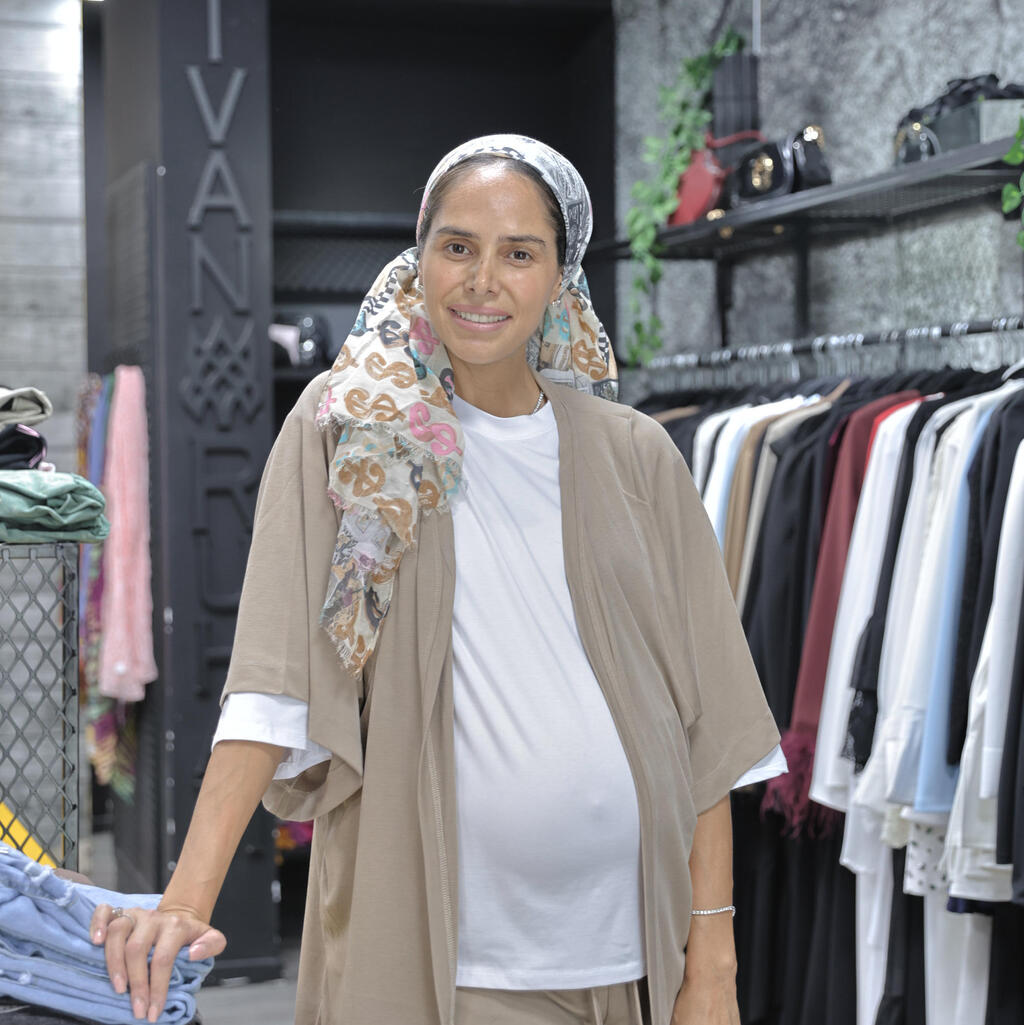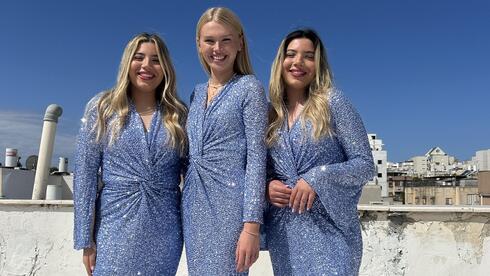When the Gaza war broke out on October 7, Sivan Ruham Moshe—a 38-year-old mother and boutique owner from Ramla—felt something shift inside her.
“I understood I was here on a mission,” she said. Her small shop, which for years sold elegant, modest clothing to local women, suddenly became the beating heart of a growing spiritual revival sweeping Israeli social media.
5 View gallery

Sivan Ruham Moshe
(Photo: Orel Cohen)
“In those first weeks of the war, I saw clip after clip of girls burning or throwing away revealing clothes,” she said. “They were doing it out of faith—believing it would help bring the hostages and soldiers home safely. I wanted to take that faith and turn it into action.”
הורים יקרים, הטיקטוק מלא בסרטונים כאלו שהבנות שלכן חשופות אליהן, תדברו איתן ותסבירו להן שהן לא אשמות במצב באף צורה. pic.twitter.com/PFFPkccdZo
— 🎗️מורן זר קצנשטיין Moran Zer Katzenstein (@ZerMoran) October 11, 2023
So she made an announcement: any woman who committed to dressing modestly would receive a free dress from her boutique. “Thank God, I handed out so many dresses,” she said with a proud smile. “It’s all from above. I just follow where He leads me.”
Ruham Moshe didn’t plan to become a social media phenomenon—but that’s exactly what happened. Her TikTok videos mix sincerity and humor, racking up hundreds of thousands of views.
5 View gallery
Israeli singer Odeya Azoulay
(Photo: Eran Levi)
In one viral video, a “thief” dressed in black snatches shopping bags from a woman leaving her store. The drama turns comedic when Ruham Moshe chases after her, only to gift her the same modest outfits she had “lost.” The clip ends with a laugh and a message: “What’s meant for you will never be stolen.”
“People feel the truth behind it,” she said. “It’s not polished marketing—it’s life. I’m not preaching, I’m sharing joy.”
In another clip, she and a friend sing a parody of a pop hit. In a third, they literally climb a “ladder of modesty,” rewarding each other for small spiritual steps: “You wore a long skirt today? You’ve gone up a level!”
Her story began long before the TikTok boom. Ruham Moshe started selling modest clothing from her home more than a decade ago. “I grew up traditional but not religious,” she said. “I came back to faith 17 years ago, and dressing modestly was one of the hardest changes for me.”
Over time, she noticed that more secular women were curious about modest fashion—but didn’t want to sacrifice style. “They walk in wearing jeans and leave with a modest dress,” she said. “I tell them: my clothes aren’t ‘Bnei Brak style.’ They’re modest, but modern.”
5 View gallery
She sees her boutique not only as a business, but as a bridge between worlds. “I have religious, traditional, and completely secular clients,” she said. “All of them want to feel beautiful. And when they put on a modest dress, something changes—not just in how they look, but in how they carry themselves.”
Critics sometimes accuse Ruham Moshe’s designs of being too fitted to count as truly modest. She’s unfazed.
“Yes, there are strict rules in Jewish law,” she said. “But everyone grows at their own pace. You don’t become religious overnight. What matters is intention and effort.”
5 View gallery
Her approach—blending spirituality with accessibility—has made her a role model for a new kind of faith-driven influencer: women who speak openly about religion but package it in the language of lifestyle, humor, and authenticity.
“Instagram and TikTok are just tools,” she said. “If they can bring someone closer to faith—or even just make her feel more confident—then that’s my mission accomplished.”
Since the start of the war, modest fashion has surged across Israel’s social platforms. Videos of women pledging to “take on modesty for the sake of the soldiers and hostages” have drawn millions of views. In some, teenagers are seen cutting short shorts or trading tank tops for long skirts, framing it as an act of faith and solidarity.
This modesty revival has also become a lucrative business. Dozens of small boutiques—run mostly by women—combine faith-based messages with marketing savvy. Many of their clips resemble mini-dramas: part comedy sketch, part spiritual sermon, part fashion ad.
“Modesty doesn’t have to be dull,” Ruham Moshe said. “It can be colorful, elegant, full of joy. The point isn’t to hide—it’s to shine differently.”
The phenomenon has drawn the attention of cultural experts who see it as part of a broader national mood.
Dr. Rachel Getz-Salomon, head of the Fashion Design Department at the University of Haifa, sees it as a fascinating mix of empowerment and control.
5 View gallery
“Within the rigid boundaries of modesty, these women are asserting their independence,” she explained. “They follow the letter of the law—but do it their own way: tight fabrics, shiny textures, bold colors. It’s rebellion disguised as piety.”
But she also warns of a more conservative undercurrent. “When modesty becomes linked to nationalism or holiness, it can end up policing women’s bodies,” she said. “Still, there’s something powerful about women reclaiming that language for themselves.”
What began as a war-time gesture of spiritual unity has evolved into a wider cultural phenomenon—part religious revival, part social media trend, part feminist reinterpretation.
“People think modesty is about restriction,” Ruham Moshe said. “But it’s actually about freedom—the freedom to define beauty on your own terms.”
Her words resonate with a generation of Israeli women rethinking how faith fits into modern life. Whether as believers, influencers, or simply seekers, they’re turning long skirts and headscarves into something larger: symbols of identity, resilience, and quiet strength.
“It’s not just about clothes,” Ruham Moshe said softly. “It’s about who we are becoming—one modest step at a time.”
link

